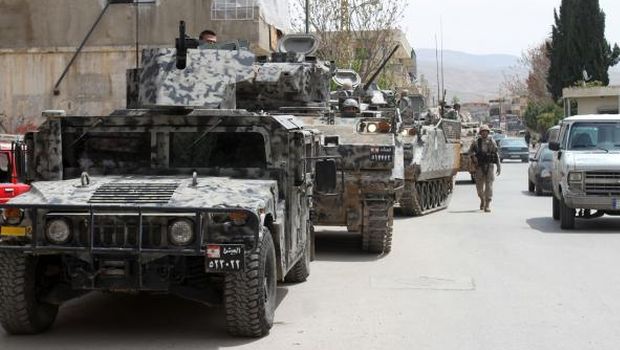
Lebanese security forces patrol a street in Baalbeq’s Al-Sharawneh neighborhood as part of the reinforcement of security measures in the Beqaa Valley, near the border with Syria on April 12, 2014 in eastern Lebanon. (AFP Photo/STR)
Beirut, Asharq Al-Awsat—The Lebanese army and internal security forces continued efforts to implement the government’s new security plan for the fourth consecutive day on Saturday, as the Lebanese government continued its efforts to contain the spillover from the conflict in neighboring Syria.
The security plan, drawn up by the Higher Defense Council, has seen the deployment and reinforcement of Lebanese troops and police in the east of the country, in the Beqaa region, and the northern city of Tripoli. Reports said the defense plan was also about to be implemented in the capital Beirut.
The army imposed a tight cordon around the Sharawneh district of the town of Baalbeq, where a majority of the Ja’afar clan resides, and which has been the scene of a number of clashes between the army and other tribes, with some fighters deploying rockets. The area is also believed to contain a number of people wanted by the security forces for assaults on army personnel and drug offences.
Reports said Ali Al-Shaar, who is accused of leading a major criminal gang involved in a number of kidnappings, was arrested during a joint security operation in Sharawneh. The raids were reportedly carried out by units from the Lebanese army’s Airborne Regiment and Sixth Mechanized Brigade in the Wasaa district, west of Baalbeq.
Sources close to the security operation said: “The security plan [has been] very successful and was still ongoing,” and that it would be expanded to include other parts of Lebanon.
The sources, speaking on condition of anonymity, told Asharq Al-Awsat that the security plan will soon be implemented in Beirut, especially in the western suburbs, the southern Daheih, and other areas. They added that the army and security forces had a “green light” to enter all areas.
The sources claimed that regional and international political support, in addition to public demand for added security, would guarantee success of the security forces’ efforts.
They added that the plan did not include efforts to disarm Hezbollah.
A statement by the Lebanese army said its units continued to execute the security plan in Tripoli and Beqaa to impose security and apprehend wanted criminals. The statement said a Syrian man was arrested in the Arsal area near the border on suspicion of being affiliated to a terrorist group.
Meanwhile, the general directorate of the internal security forces said it was continuing to implement the security plan in Beqaa by building roadblocks and launching raids to apprehend wanted criminals. The directorate added that the Beqaa security plan aimed to arrest 57 suspects who faced various charges in the towns of Braital, Sharqnew and others.
Interior Minister Nihad Mashnouq has called the Braital town and the surrounding area the “death square” because of the number of suspects wanted in connection to kidnappings and car thefts believed to be at large there.
In the northern city of Tripoli, army intelligence detained the media officer of the pro-Assad Arab Democratic Party (ADP), Abdel-Latif Saleh, for questioning on Saturday morning, but released him later that day.
Saleh told Asharq Al-Awsat that the secretary-general of the ADP, Rifaat Eid, was still in the Jabal Mohsen area with more than 70,000 supporters. He said the arrest warrants for him and his father Ali “were a political matter which will be resolved politically”.
Reports circulated at the end of last month that Eid had escaped to Syria, but he has since denied this.
The state commissioner at the Military Court, Saqr Saqr, said he referred 11 people from Bab El-Tabbaneh to court on charges of forming an armed gang in order to commit crimes against public and property, undermining the authority of the state and attacking its institutions, and opening fire on security force personnel and causing sectarian strife.
The Jabal Mohsen and Ban El-Tabbaneh districts of Tripoli have been the scene of intense bouts of violence since the outbreak of the Syrian conflict, with Alawite residents of Jabal Mohsen and Sunni residents of Bab El-Tabbaneh backing different sides.
Ali Eid is sought for questioning by the Lebanese authorities in connection to the bombing of two Sunni mosques in August 2013, an attack which killed more than 40 people.
The Lebanese government decided, in its first session after winning the vote of confidence in March, to implement the security plan drawn by the Higher Defense Council in tense areas, especially Tripoli and Beqaa.
The government said it tasked the army and the internal security forces with implementing the plan to crack down on the existence of armed militias, confiscate all arms depots in Tripoli and its suburbs, and to execute the arrest warrants and take control the security situation in all areas.
